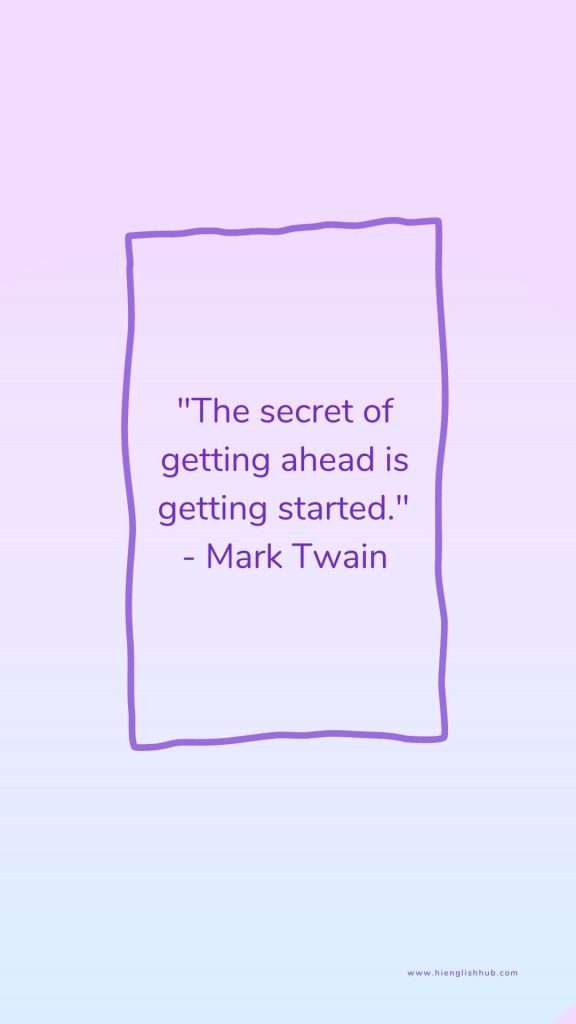Are you feeling unmotivated to study? Struggling to stay focused and productive?
Don’t worry. You’re NOT alone!
Many students face the same challenge, but the good news is that there are plenty of clever ways to boost your study motivation.
In this blog post, we’ll explore 29 brilliant ideas to help you find the inspiration you need to succeed.
From inspirational quotes to fun games, there’s something for everyone!
1. Get Inspired With Quotes
Motivation can be hard to find, but sometimes, all we need is a little inspiration.
That’s where quotes come in!
Quotes are a great way to get inspired and find the motivation you need to push through your studies.
Here are 45 study motivation quotes to get you started:
1. “Don’t study to earn, study to learn.” – Unknown
2. “Procrastination is like a credit card: it’s a lot of fun until you get the bill.” – Christopher Parker

3. “I find television very educational. Every time someone turns it on, I go in the other room and read a book.” – Groucho Marx
4. “I have never let my schooling interfere with my education.” – Mark Twain
5. “If you want to achieve greatness, stop asking for permission.” – Unknown
6. “I don’t always study, but when I do, I prefer to do it with a cup of coffee and some good tunes.” – Anonymous

7. “Study like you’re running out of time, because time is running out.” – Unknown
8. “Success is the sum of small efforts repeated day in and day out.” – Robert Collier
9. “You don’t have to be great to start, but you have to start to be great.” – Zig Ziglar

10. “The will to succeed is important, but what’s more important is the will to prepare.” – Bobby Knight
11. “Study like a boss, party like a pro.” – Unknown
12. “The secret of getting ahead is getting started.” – Mark Twain

13. “Believe you can and you’re halfway there.” – Theodore Roosevelt
14. “Education is the passport to the future, for tomorrow belongs to those who prepare for it today.” – Malcolm X
15. “You don’t need to be perfect to inspire others. Let people get inspired by how you deal with your imperfections.” – Unknown
16. “Don’t let yesterday take up too much of today.” – Will Rogers

17. “Chase your dreams, not your fears.” – Unknown
18. “I never dreamed about success, I worked for it.” – Estée Lauder

19. “Success is not final, failure is not fatal: It is the courage to continue that counts.” – Winston Churchill
20. “The only way to do great work is to love what you do.” – Steve Jobs

21. “You have brains in your head. You have feet in your shoes. You can steer yourself any direction you choose.” – Dr. Seuss
22. “The difference between ordinary and extraordinary is that little extra.” – Jimmy Johnson
23. “Believe in yourself and all that you are. Know that there is something inside you that is greater than any obstacle.” – Christian D. Larson
24. “Your only limit is the amount of desire you have.” – Unknown
25. “Success is not the key to happiness. Happiness is the key to success. If you love what you are doing, you will be successful.” – Albert Schweitzer
26. “The only thing that stands between you and your dream is the story you keep telling yourself that you can’t achieve it.” – Jordan Belfort
27. “I’m not telling you it’s going to be easy, I’m telling you it’s going to be worth it.” – Art Williams
28. “The best way to predict your future is to create it.” – Abraham Lincoln
29. “The more that you read, the more things you will know. The more that you learn, the more places you’ll go.” – Dr. Seuss
30. “The future belongs to those who believe in the beauty of their dreams.” – Eleanor Roosevelt
31. “Champions keep playing until they get it right.” – Billie Jean King
32. “There are no shortcuts to any place worth going.” – Beverly Sills
33. “Believe in yourself, take on your challenges, dig deep within yourself to conquer fears. Never let anyone bring you down. You got this.” – Chantal Sutherland
34. “Your positive action combined with positive thinking results in success.” – Shiv Khera
35. “If you can’t fly then run, if you can’t run then walk, if you can’t walk then crawl, but whatever you do you have to keep moving forward.” – Martin Luther King Jr
36. “Chase your dreams but always know the road that will lead you home again.” – Tim McGraw

37. “You have to expect things of yourself before you can do them.” – Michael Jordan
38. “Push yourself, because no one else is going to do it for you.” – Unknown
39. “You are never too old to set another goal or to dream a new dream.” – C.S. Lewis
40. “The expert in anything was once a beginner.” – Helen Hayes
41. “I am not a genius, I am just curious.” – Albert Einstein
42. “Chase your dreams until you catch them…and then dream, catch, and dream again!” – Dee Marie
43. “It does not matter how slowly you go as long as you do not stop.” – Confucius
44. “If you really want to do something, you’ll find a way. If you don’t, you’ll find an excuse.” – Jim Rohn
45. “Don’t watch the clock; do what it does. Keep going.” – Sam Levenson
2. Create An Inviting Study Space
Your study space can affect your motivation to study.
If it’s cluttered, uncomfortable, or uninviting, you might feel unmotivated and distracted.
So, it’s essential to create a study space that’s comfortable, organized and inspires you to study.
You can start by decluttering and organizing your study space, choosing a comfortable chair, and adding some decorations that motivate you.
For example, you can hang up some motivational posters, use a plant or two to add some greenery or use your favorite colors to decorate your space.
3. Apply Proven Study Techniques
Effective studying is crucial to staying motivated.
There are many proven study techniques, such as the Pomodoro Technique, active recall, and spaced repetition.
These techniques can help you stay focused, improve your retention, and make your study time more efficient. For example, the Pomodoro Technique involves studying in 25-minute increments with a five-minute break in between.
This technique helps you stay focused and avoid burnout.
The active recall involves testing yourself on what you’ve learned, which improves your retention and helps you identify areas that need more work.
Spaced repetition involves reviewing material at increasing intervals, which helps you remember it for the long term.
4. Have Fun with Unconventional Methods
Who says studying has to be boring?
Why not spice things up and try some unconventional methods to keep yourself motivated and engaged?
There are many ways to make studying fun, such as turning your notes into a song, creating flashcards with colorful images and designs, or even using mnemonic devices to remember important information.
You could also try incorporating games or puzzles into your study sessions or challenging yourself with fun quizzes and trivia.
Another unconventional method is to use role-play or storytelling to help you understand and retain information better.
Don’t be afraid to get creative and experiment with different study techniques until you find what works best for you.
Remember, the key is to enjoy the learning process and make it as engaging and enjoyable as possible.
5. Stay Positive
A positive attitude can make all the difference in staying motivated.
Instead of focusing on your mistakes or shortcomings, focus on your progress and successes.
When you feel discouraged, remind yourself of how far you’ve come and how much you’ve already accomplished.
You can also practice positive self-talk by using affirmations, such as “I am capable of learning anything I set my mind to” or “I am a hard worker and can achieve my goals.”
These affirmations can help you overcome self-doubt and stay motivated.
6. Practice Mindfulness
Mindfulness can be a game-changer for your study motivation.
It’s all about being present in the moment and focusing your attention on what’s happening right now.
When you’re studying, it’s easy to get caught up in your thoughts, worries, or distractions. But practicing mindfulness can help you stay grounded and focused.
One way to practice mindfulness while studying is to take deep breaths and pay attention to your breath. Notice how it feels as it enters and leaves your body.
If you find your mind wandering, gently bring your attention back to your breath. You can also try a quick meditation to clear your mind and help you refocus.
Another mindfulness technique is to take short breaks during your study sessions to stretch, take a walk, or just look away from your screen. This can help prevent burnout and keep your mind fresh.
7. Set Attainable Goals
Setting goals is an essential part of achieving success in any area of life, including studying.
When you set goals, you give yourself something to work towards, which can help motivate you and keep you focused.
However, it’s crucial to set goals that are attainable and realistic. Set small, manageable goals that you can achieve within a reasonable timeframe.
For example, instead of setting a goal to study for eight hours straight, set a goal to study for 30 minutes without any distractions.
When you reach your goal, reward yourself and then set another one.
8. Find a Study Buddy
Studying alone can be tedious and uninspiring.
That’s why finding a study buddy can be a great way to make studying more enjoyable and effective.
A study buddy can help keep you accountable, offer support and encouragement, and help you understand concepts you may struggle with.
Finding a study buddy can be as simple as asking a classmate if they want to study together. You can also join a study group or forum to connect with others who are studying the same subject. It’s important to find someone who is reliable and motivated, as well as someone who you get along with.
Studying with a friend is not just about getting work done. It’s also about building relationships and enjoying the learning process together. So don’t be afraid to laugh, chat, and have fun while you study!
9. Set Up Study Challenges With Friends
Studying with friends can be a great way to make the learning experience more enjoyable and productive.
But have you ever considered making it even more challenging and fun by setting up study challenges with your friends?
For example, if you’re studying English as a second language, you could challenge your friends to a vocabulary or grammar quiz.
You could also set a goal for everyone to read a certain number of articles or books in a week and then discuss them together.
Not only does this make studying more engaging and competitive, but it also helps you stay accountable and on track with your learning goals.
Plus, it’s a great way to learn from and teach each other and bond with your study group.
10. Use Music to Boost Your Mood
Let’s face it, studying can be a real drag sometimes. But what if there was a simple trick to make it more enjoyable?
Well, there is! Cue the music.
Music has a powerful effect on our moods and emotions and can be a great tool to help you focus and stay motivated while studying.
Of course, not all music is created equal. While some prefer classical music or instrumental tracks, others find upbeat pop songs or movie soundtracks more effective.
The key is to experiment and find what works best for you. Create a playlist of your favorite songs or search for study-specific playlists on music streaming platforms.
Just make sure to choose songs without distracting lyrics or jarring rhythms that could disrupt your focus. You want to create a positive, engaging study environment, not turn your workspace into a concert hall.
So next time you’re bored or unmotivated while studying, try music.
You might be surprised at how much it can boost your mood and productivity.
11. Track Your Progress
When it comes to studying, it can be easy to feel like you’re not progressing or getting any better.
But by tracking your progress, you can see how far you’ve come and give yourself a sense of accomplishment.
I personally love using a bullet journal to track my study sessions and assignments. Not only does it help me stay organized, but it also feels satisfying to check off completed tasks.
If you’re not into journaling, you can also try using an app or online tool to track your progress.
You can also try to create a visual representation of your progress, such as a graph or chart, to see your progress over time. This can be especially helpful for long-term goals or projects that may take several weeks or months to complete.
Seeing your progress over time can help you feel accomplished and motivated to keep going.
12. Visualize Success
Have you ever heard of the power of visualization?
It involves creating a mental picture of yourself succeeding in your studies, which can increase your motivation and confidence. By imagining yourself accomplishing your goals, you can reduce anxiety and negative self-talk and improve your chances of success.
For example, if you’re preparing for the IELTS exam, you can visualize yourself confidently answering the questions and achieving your desired score.
You can picture yourself sitting in the exam room, feeling calm and focused, and successfully completing each section of the test. This can help you approach your studies with a positive attitude and a sense of purpose, which can improve your overall performance.
However, visualization is not a magic solution; it won’t replace hard work and preparation. Visualize the steps you’ll take to get there, too. See yourself studying diligently, asking questions when you need help, and overcoming obstacles along the way.
13. Embrace Your Learning Style
We all have our own unique way of learning, whether it’s visual, auditory, or hands-on.
Embracing your learning style can make studying more effective and enjoyable.
For instance, if you’re a visual learner, try using diagrams or mind maps to help you understand concepts.
Or perhaps you’re an auditory learner; try recording yourself explaining the material and listening to it later.
If you’re a hands-on learner, try using props or models to help you understand complex ideas.
Knowing your learning style and using it to your advantage can help you retain information better and make studying more enjoyable.
14. Learn From Your Mistakes
We all make mistakes sometimes, and that’s okay!
Instead of getting discouraged by mistakes, try to learn from them.
For example, if you got a low score on a practice test, take the time to analyze what went wrong and how you can improve.
Did you struggle with time management? Did you misunderstand a key concept?
By identifying your mistakes and working to correct them, you can make progress and improve your performance on future assessments.
15. Get Enough Sleep
I know it can be tempting to stay up late studying or watching Netflix, but getting enough sleep is crucial for your brain to function at its best.
Lack of sleep can lead to poor concentration, memory problems, and even depression.
Make sure you’re getting at least 7-8 hours of sleep each night, and try to establish a regular sleep schedule so your body knows when it’s time to wind down.
And if you have an important test or presentation coming up, make sure you get a good night’s sleep the night before so you’re well-rested and ready to go.
16. Stay Hydrated And Nourished
It’s no secret that staying hydrated and nourished is important for your overall health and well-being, but did you know it can also affect your ability to focus and retain information while studying?
Drinking enough water throughout the day can help keep you alert and energized while eating healthy and nutritious foods can provide the fuel your brain needs to function at its best.
Aim to drink at least eight glasses of water per day and choose foods high in protein, healthy fats, and complex carbohydrates to keep your body and mind in top shape.
You can even make it fun by trying new recipes and snacks that are both delicious and nutritious.
17. Exercise For Better Focus
While taking time away from studying to exercise may seem counterintuitive, it can do wonders for your focus and productivity.
Regular exercise has been shown to boost cognitive function, increase alertness, and reduce stress and anxiety—all of which can positively impact your studying. Even just a short 20-30 minute workout can make a big difference.
Consider incorporating a brisk walk, yoga session, or quick strength training routine into your study schedule to help you stay energized and focused.
18. Change Up Your Study Routine
If you’ve been studying the same way for a while and are feeling stuck in a rut, it might be time to switch things up.
Experiment with different study methods, like reading out loud, creating flashcards, or listening to lectures while taking notes.
You can also change your study environment by moving to a new location, like a coffee shop or library.
Adding variety to your study routine can help keep you engaged and motivated and may even help you retain information better.
19. Design A Personalized Study Planner
Designing a personalized study planner is a great way to organize your study sessions and stay on track.
Instead of relying on a generic planner, create one that suits your unique study habits and preferences.
Start by setting realistic goals for each study session and prioritizing tasks based on their importance and deadlines. Then, consider factors such as your energy levels and preferred study environment when scheduling your sessions.
Don’t be afraid to get creative with your planner, adding color, stickers, or even motivational quotes (review tip #1) to keep you inspired.
Having a well-designed planner can make studying feel less like a chore and more like a fun and productive activity.
I love decorating my planner with fun stickers and colorful pens. It helps me stay engaged and motivated to stick to my study schedule.
Give it a try and see how it can enhance your study routine.
20. Teach Someone What You’ve Learned
They say the best way to learn something is to teach it to someone else.
This is because teaching requires you to fully understand a topic and be able to explain it clearly and concisely.
So why not try teaching a friend or family member something you’ve learned while studying?
Not only will it help reinforce your own understanding, but it can also be a fun and engaging way to connect with others and share knowledge.
21. Make Energizing Study Snacks
When studying for long periods, it’s essential to keep your energy levels up with healthy snacks that can boost nutrition and keep you focused.
Instead of reaching for sugary or processed snacks that can leave you feeling sluggish, try making your own energizing study snacks.
Some examples include protein-packed smoothies, trail mix with nuts and dried fruit, or whole-grain crackers with hummus.
Choosing nutritious and delicious snacks can fuel your body and mind for optimal studying performance.
Study Motivation: FAQ
How Can I Get Motivated To Study?
You can find your motivation by setting specific goals, creating a study plan, rewarding yourself, and finding a study buddy. Also, try to break up your study sessions into manageable chunks eliminate distractions, and use positive self-talk to boost your confidence.
Why Am I So Unmotivated To Study?
There could be many reasons why you’re feeling unmotivated to study. Sometimes it can be as simple as feeling tired or overwhelmed. Other times, it could be due to a lack of interest in the subject or a fear of failure.
It’s important to identify the root cause of your lack of motivation so that you can address it directly. Try breaking down your goals into smaller, more manageable tasks, or find ways to make the subject matter more engaging and relevant to your interests.
Additionally, make sure you’re taking care of yourself by getting enough rest, exercise, and healthy food. Surrounding yourself with supportive friends and family members can also provide the encouragement and motivation you need to keep going.
Why Is It So Hard For Me To Focus On Studying?
There can be a variety of factors that make it difficult to focus on studying, such as boredom, stress, and distractions. Try identifying and removing or minimizing these distractions, using different study techniques to keep things interesting, and taking breaks as needed.
Why Do I Forget When I Study?
Forgetting can be caused by a lack of understanding or engagement with the material, not giving your brain enough time to consolidate the information, or not reviewing the material regularly. Try engaging with the material in different ways (such as through active recall or teaching the material to someone else), spaced repetition, and regular review.
How Can I Get Motivated To Study When I’m Bored?
Try finding ways to make the material more interesting, such as by finding a real-world application or connecting it to something you’re passionate about. You can also try breaking up your study sessions into shorter, more manageable chunks, or rewarding yourself for progress made.
Final Thoughts On Study Motivation
Motivation is a personal journey; what works for one person may not work for another.
So, whether it’s visualizing success, embracing your learning style, or setting up study challenges with friends, don’t be afraid to experiment and find what works best for you.
I hope you found some tips and tricks that resonate with you.
Also, don’t forget to share this post with your friends who could use some study motivation.
We all need a little push sometimes, and your share might inspire someone else to reach their academic goals.
If you enjoyed this post and want to see more content like this, be sure to follow me on Pinterest and Twitter.
Thanks for reading, and happy studying!


